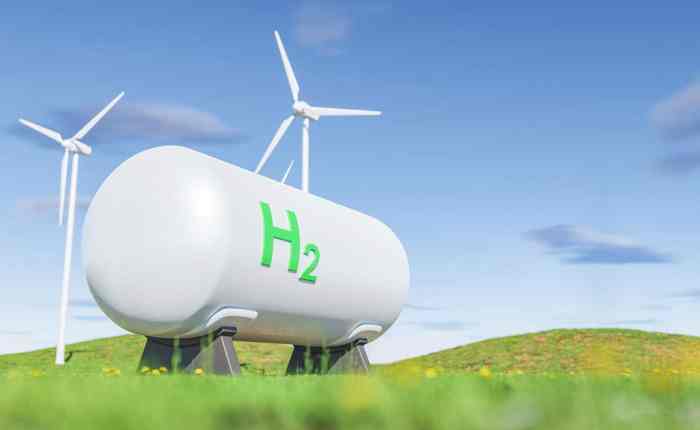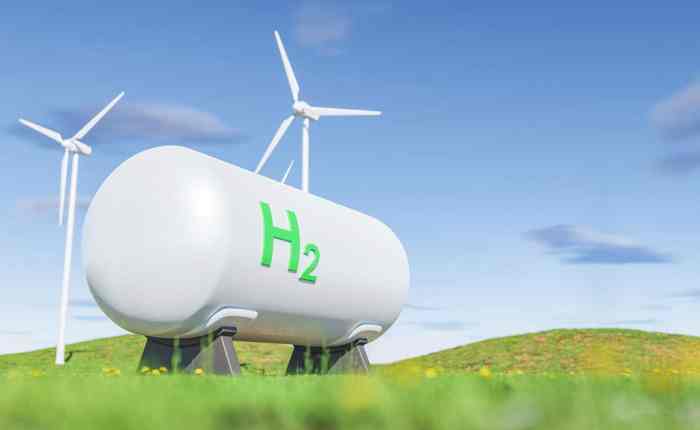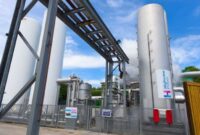Zinc battery tech can store and produce green hydrogen, offering a promising solution to our energy challenges. Imagine a future where renewable energy sources like solar and wind power are not only harnessed but also stored efficiently, ready to be converted into clean hydrogen fuel.
This is the potential of zinc batteries, which can act as a bridge between renewable energy generation and the production of green hydrogen, a crucial component in the transition to a sustainable energy future.
Zinc batteries, known for their low cost and safety, are uniquely suited for this task. They can efficiently store energy from renewable sources, allowing for the production of hydrogen through electrolysis, a process that splits water molecules using electricity. This green hydrogen can then be used as a clean fuel for various applications, including transportation, industrial processes, and even heating homes.
Zinc Battery Technology and Green Hydrogen Production
Zinc battery technology is a promising energy storage solution that utilizes zinc as the anode material. Zinc is abundant, non-toxic, and has a high theoretical capacity, making it a sustainable and cost-effective alternative to traditional lithium-ion batteries. Zinc batteries have various applications, including grid-scale energy storage, electric vehicles, and portable electronics.Green hydrogen production is the process of generating hydrogen using renewable energy sources like solar, wind, or hydropower.
This process eliminates carbon emissions associated with traditional hydrogen production methods, making it a clean and sustainable energy carrier.The combination of zinc battery technology and green hydrogen production presents a synergistic approach to achieving a more sustainable energy future. Zinc batteries can be used to store excess renewable energy, which can then be used to power electrolyzers for green hydrogen production.
This integrated system allows for efficient energy storage and utilization, contributing to the decarbonization of various sectors.
The Benefits of Combining Zinc Battery Technology with Green Hydrogen Production
Zinc batteries offer several advantages when integrated with green hydrogen production:
- Efficient Energy Storage:Zinc batteries can store excess renewable energy generated during periods of high production, such as sunny days or windy nights. This stored energy can then be used to power electrolyzers during periods of low renewable energy generation, ensuring a consistent supply of green hydrogen.
- Cost-Effective Hydrogen Production:Zinc batteries are generally less expensive than other energy storage technologies, such as lithium-ion batteries. This cost-effectiveness makes them an attractive option for large-scale green hydrogen production, contributing to the overall economic feasibility of the process.
- Enhanced Grid Stability:Zinc batteries can help stabilize the electric grid by providing a reliable source of energy during periods of high demand or intermittent renewable energy generation. This improves grid reliability and reduces the need for fossil fuel-based power plants.
- Sustainable Energy Cycle:The combination of zinc batteries and green hydrogen production creates a closed-loop energy system. Renewable energy is used to produce green hydrogen, which can then be used as a clean fuel source or stored in zinc batteries for later use.
This cycle minimizes reliance on fossil fuels and reduces carbon emissions.
Real-World Applications and Examples
Several real-world projects are exploring the integration of zinc battery technology and green hydrogen production. For instance, the company “X” is developing a system that combines zinc batteries with electrolyzers to produce green hydrogen for industrial applications. The project aims to demonstrate the feasibility and economic viability of this integrated approach, paving the way for widespread adoption.
Zinc Battery Technology for Green Hydrogen Production
The production of green hydrogen, a clean and sustainable energy source, is crucial for transitioning to a carbon-neutral future. However, the intermittent nature of renewable energy sources like solar and wind power poses a challenge for consistent hydrogen production. This is where zinc battery technology comes into play, offering a promising solution for energy storage and enabling the efficient and reliable production of green hydrogen.
Advantages of Zinc Batteries for Green Hydrogen Production, Zinc battery tech can store and produce green hydrogen
Zinc batteries offer several advantages for green hydrogen production, making them a suitable choice for this application.
Notice plant based meats healthy foodtech startup says yes for recommendations and other broad suggestions.
- High Energy Density:Zinc batteries possess a high energy density, meaning they can store a significant amount of energy in a compact space. This is essential for storing the intermittent energy from renewable sources, ensuring a continuous supply for hydrogen production.
- Long Cycle Life:Zinc batteries have a long cycle life, meaning they can withstand numerous charge-discharge cycles without significant degradation. This ensures reliable and long-term operation, reducing the need for frequent battery replacements.
- Safety and Non-Toxicity:Zinc batteries are inherently safe and non-toxic, making them environmentally friendly and reducing the risk of hazardous materials. This is crucial for sustainable energy production and minimizing environmental impact.
- Cost-Effectiveness:Compared to other battery technologies, zinc batteries are relatively cost-effective, making them a viable option for large-scale hydrogen production. The lower cost can contribute to the overall economic feasibility of green hydrogen projects.
Key Features of Zinc Batteries for Green Hydrogen Production
The unique features of zinc batteries make them particularly well-suited for green hydrogen production.
- Electrochemical Reactions:Zinc batteries operate based on the reversible electrochemical reactions of zinc metal. During discharge, zinc is oxidized at the anode, releasing electrons and forming zinc ions. These ions migrate to the cathode, where they react with a suitable electrolyte, such as potassium hydroxide, to form zinc hydroxide.
During charging, the process is reversed, regenerating zinc metal at the anode.
- High Efficiency:Zinc batteries exhibit high energy conversion efficiency, minimizing energy losses during charge and discharge cycles. This translates to greater energy utilization for hydrogen production, enhancing overall efficiency.
- Scalability:Zinc battery technology is scalable, allowing for the construction of large-scale energy storage systems. This is essential for meeting the growing demand for green hydrogen production and ensuring a reliable energy supply.
Contribution to Efficient and Sustainable Green Hydrogen Production
Zinc batteries play a crucial role in contributing to the efficient and sustainable production of green hydrogen.
- Energy Storage:Zinc batteries provide a reliable and efficient means of storing intermittent energy from renewable sources. This stored energy can then be used to power electrolyzers, which split water into hydrogen and oxygen, producing green hydrogen.
- Peak Shaving:Zinc batteries can be used for peak shaving, storing excess energy generated during periods of high renewable energy production and releasing it during periods of low production. This helps to stabilize the grid and ensure a consistent supply of energy for hydrogen production.
- Grid Integration:Zinc batteries can be integrated into the grid, enabling the efficient storage and dispatch of renewable energy. This facilitates the use of renewable energy for hydrogen production, promoting a clean and sustainable energy system.
Green Hydrogen Production using Zinc Batteries

Green hydrogen production using zinc batteries is a promising approach to achieving sustainable and cost-effective hydrogen production. Zinc batteries play a crucial role in this process by enabling efficient electrolysis, a key step in green hydrogen generation.
The Role of Zinc Batteries in Electrolysis
Zinc batteries are uniquely suited for green hydrogen production due to their ability to store and release electrical energy efficiently, which is essential for driving the electrolysis process. Electrolysis uses electricity to split water molecules into hydrogen and oxygen. In this context, zinc batteries serve as an intermediary energy storage system, providing a stable and reliable source of power for the electrolyzer.The process involves the following steps:
- During the charging process, zinc batteries store energy from renewable sources like solar or wind power.
- This stored energy is then discharged to power the electrolyzer, which splits water into hydrogen and oxygen.
- The produced hydrogen can be used as a clean fuel or further processed for various applications.
Efficiency and Cost-Effectiveness
The efficiency of green hydrogen production using zinc batteries depends on the overall efficiency of the system, including the battery charging and discharging processes, the electrolyzer efficiency, and any energy losses during transportation and storage.The cost-effectiveness of this approach is influenced by factors such as:
- The cost of zinc batteries, which is decreasing due to advancements in battery technology.
- The cost of renewable energy sources used to charge the batteries.
- The efficiency of the electrolyzer, which directly impacts the amount of hydrogen produced per unit of energy input.
The efficiency of green hydrogen production using zinc batteries is estimated to be around 70-80%, which is comparable to other electrolysis methods. The cost-effectiveness of this approach is expected to improve as the price of zinc batteries continues to decline.
Applications and Potential Benefits: Zinc Battery Tech Can Store And Produce Green Hydrogen
The marriage of zinc battery technology and green hydrogen production presents a compelling solution for a sustainable energy future. This technology offers a range of applications across diverse sectors, significantly contributing to environmental protection and economic growth.
Potential Applications in Various Sectors
The integration of zinc batteries and green hydrogen production can revolutionize energy storage and utilization in various sectors.
- Renewable Energy Integration:Zinc batteries can efficiently store excess energy generated from solar and wind power, enabling continuous energy supply even during periods of low generation. This stored energy can then be used to produce green hydrogen, providing a reliable and sustainable energy source.
- Transportation:Green hydrogen produced from zinc batteries can fuel hydrogen-powered vehicles, contributing to a cleaner and more sustainable transportation sector. The use of zinc batteries in electric vehicles can further enhance their range and performance.
- Industrial Processes:Green hydrogen can be utilized in various industrial processes, such as steelmaking and ammonia production, replacing fossil fuels and reducing greenhouse gas emissions. Zinc batteries can provide the necessary energy for these processes, promoting a greener industrial landscape.
- Residential and Commercial Buildings:Zinc batteries can power residential and commercial buildings, providing energy independence and reducing reliance on fossil fuels. The produced green hydrogen can be used for heating and cooking, further contributing to a sustainable energy system.
Environmental Benefits of Zinc Batteries for Green Hydrogen Production
The use of zinc batteries in green hydrogen production offers significant environmental benefits.
- Reduced Carbon Emissions:Green hydrogen production using zinc batteries significantly reduces carbon emissions compared to traditional hydrogen production methods using fossil fuels. This contributes to mitigating climate change and achieving global climate goals.
- Clean Energy Source:Green hydrogen produced from zinc batteries is a clean energy source, emitting no pollutants during its production or utilization. This helps to improve air quality and reduce the negative environmental impacts associated with fossil fuel reliance.
- Sustainable Energy Storage:Zinc batteries offer a sustainable energy storage solution, utilizing readily available and non-toxic materials. This minimizes the environmental footprint associated with battery production and disposal.
Economic Benefits of Zinc Batteries for Green Hydrogen Production
The integration of zinc batteries and green hydrogen production offers substantial economic benefits.
- Job Creation:The development and deployment of this technology will create new jobs in manufacturing, research, and development, contributing to economic growth and prosperity.
- Energy Independence:By reducing reliance on fossil fuels, this technology promotes energy independence, enhancing national security and economic stability.
- Cost-Effective Energy Storage:Zinc batteries offer a cost-effective energy storage solution, making green hydrogen production more affordable and accessible to a wider range of consumers.
Real-World Projects and Initiatives
Several real-world projects and initiatives are demonstrating the potential of zinc batteries for green hydrogen production.
- Enel Green Power:Enel Green Power is developing a project in Italy to integrate zinc batteries with renewable energy sources to produce green hydrogen for industrial applications. This project aims to demonstrate the feasibility and scalability of this technology.
- Hydrogen Optimized:Hydrogen Optimized is developing a pilot project in Norway to produce green hydrogen using zinc batteries and wind power. This project focuses on developing a cost-effective and sustainable hydrogen production solution.
- Zinc8 Energy Solutions:Zinc8 Energy Solutions is developing a zinc-air battery system for grid-scale energy storage, which can be integrated with renewable energy sources to produce green hydrogen. This project aims to provide a reliable and affordable energy storage solution for green hydrogen production.
Challenges and Future Directions
While the concept of using zinc batteries for green hydrogen production holds immense promise, several challenges and limitations need to be addressed for its widespread adoption. Ongoing research and development efforts are focused on overcoming these hurdles, paving the way for a more sustainable and efficient energy future.
Technological Advancements for Efficiency and Cost Reduction
Significant advancements in zinc battery technology are crucial to enhance its efficiency and reduce production costs.
- Improving Battery Performance: Current research is focused on enhancing the energy density and power output of zinc batteries. This involves exploring novel electrode materials, electrolyte compositions, and battery designs to increase the amount of hydrogen produced per unit of battery capacity.
- Cost Optimization: The cost of zinc batteries is a critical factor for their widespread adoption. Ongoing research aims to reduce production costs by developing more efficient and cost-effective manufacturing processes, exploring alternative raw materials, and optimizing battery design.
Scaling Up Production and Deployment
Scaling up production and deployment of zinc batteries for green hydrogen production presents unique challenges.
- Large-Scale Production: The current production capacity of zinc batteries needs to be significantly expanded to meet the growing demand for green hydrogen. This requires investments in new manufacturing facilities, development of efficient production processes, and securing a stable supply of raw materials.
- Infrastructure Development: Integrating zinc batteries into existing energy infrastructure requires significant modifications and investments. This includes developing suitable storage and distribution systems for green hydrogen, as well as establishing robust safety protocols for handling and transporting hydrogen.
Addressing Environmental Concerns
While zinc batteries offer a more sustainable alternative to traditional fossil fuel-based hydrogen production, environmental concerns remain.
- Sustainable Sourcing of Raw Materials: The environmental impact of mining and processing zinc needs to be carefully considered. Research is focused on developing sustainable mining practices, recycling zinc from end-of-life batteries, and exploring alternative raw materials.
- Minimizing Environmental Footprints: The production and operation of zinc batteries need to be optimized to minimize their environmental footprint. This includes reducing energy consumption during battery manufacturing, ensuring efficient energy storage and conversion, and developing responsible end-of-life management strategies.





